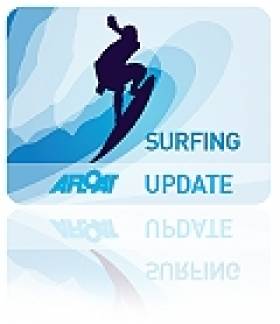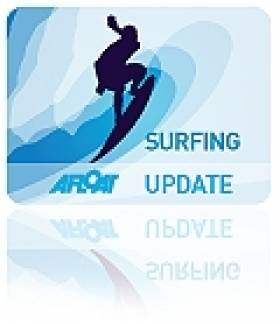Displaying items by tag: Glyn Ovens
The Wait Begins for Second Tow-In Surf Session
#SURFING - The waiting period for the second Tow-In Surf Session at Mullaghmore Head is now under way.
The invite-only list of the world's top big wave surfers has until 1 March 2012 to try to best the monster waves ridden in last February's inaugural contest.
Irish pioneers Richie Fitzgerald, Peter Conroy and Glyn Ovens will be on call for the return event, which has also invited back open teams winners Benjamin Sanchis and Éric Rebière, according to Surfworld Bundoran.
Sanchis is also the 2011 Billabong XXL biggest wave award winner, and intends to defend his crown in Sligo.
“Mullaghmore is a spectacular wave, but you really need to be prepared to surf big waves there," he said.
The first Tow-in Surf Session - which was even immortalised in a documentary - was organised by the Irish Surf Rescue Club in part to dispel the myth that tow-in surfing, where surfers are towed by jetski to bigger offshore waves, is an irresponsible activity.
“Our team has put an enormous amount of training, both here and abroad, to ensure that the sport of tow surfing and this event can be as safe as possible," said organiser Paul O'Kane.
The latest news on the second Tow-In Surf Session will be made available on the Billabong website HERE.
Surfers Take On Big Waves in Sligo
More than 20 of Ireland's and Europe's top surfers took on the monster waves at Sligo’s Mullaghmore Head at the weekend in Ireland's first ever 'big wave' surf contest.
The Tow-in Surf Session was organised by the Irish Surf Rescue Club in part to dispel the myth that tow-in surfing - where surfers are towed by jetski to bigger offshore waves - is an irresponsible activity.
Club president Paul O’Kane told The Irish Times: “Our surf riders and personal watercraft operators are all very safety conscious, highly trained, and contests like this can help to further develop skill sets.”
Eric Ribiere and Benjamin Sanchis from France took top place in the open category in a contest that rewarded skill and commitment on the biggest waves. Peter Conroy and Gyln Ovens came first in the Irish division, follwed closely by Al Mennie and Andrew Cotton.
Awards went to professional boarder Gabe Davies for best wave, Al Mennie for best barrel and Richie Fitzgerald for heaviest wipeout.
Easkey Britton also held her own as the only female competitor on the day, catching a solid 20-foot wave.
Click HERE for more video of the contest's big wave surfing action.

























































